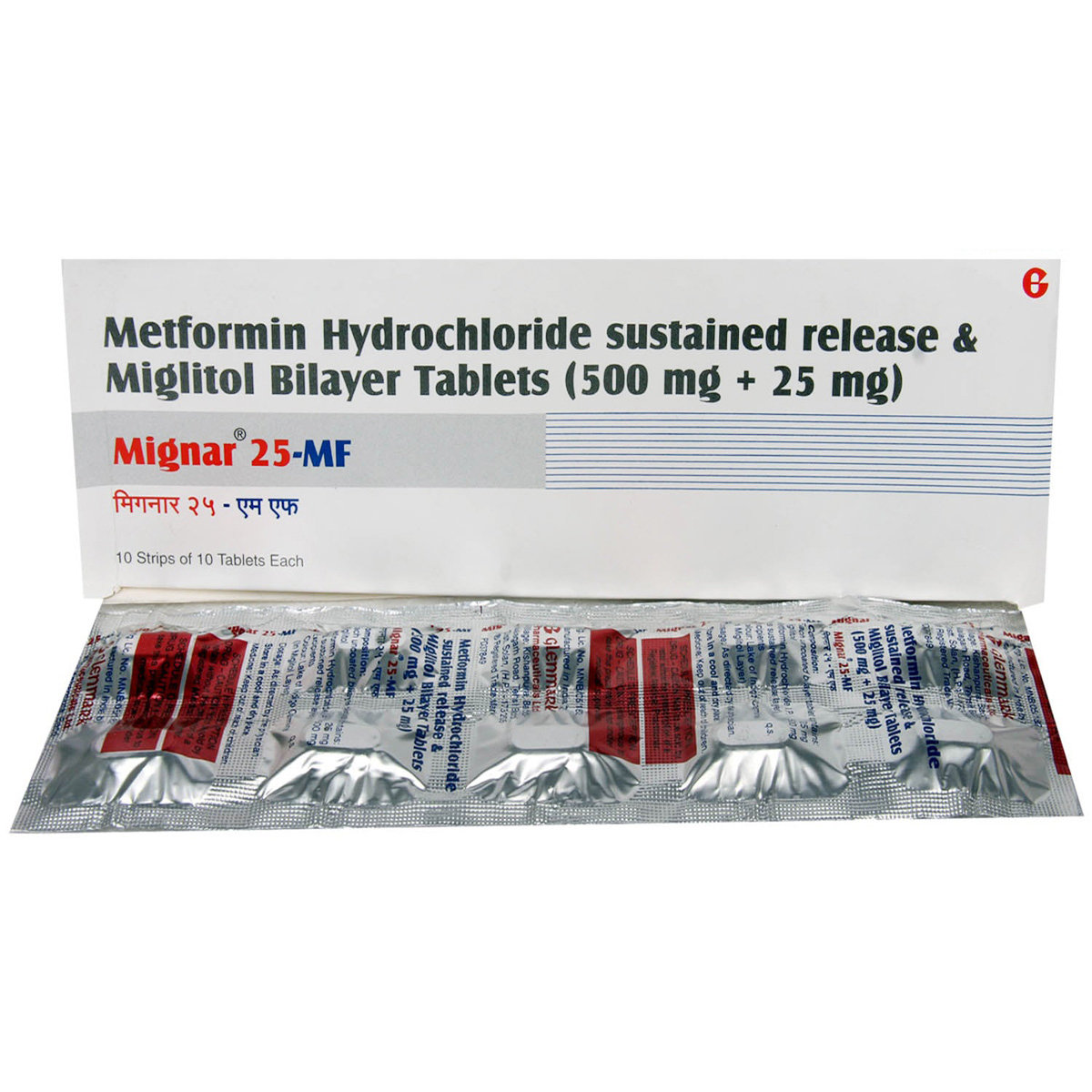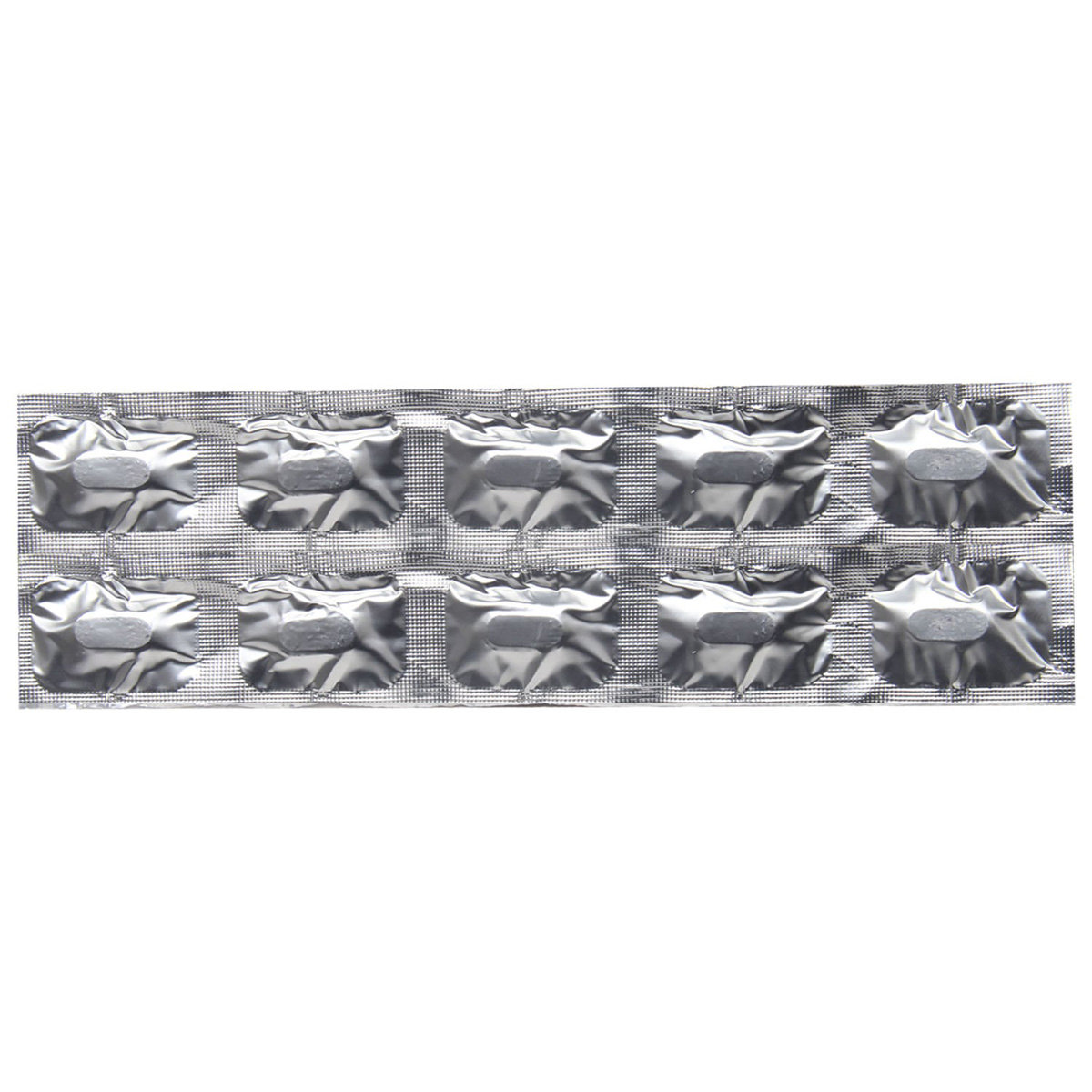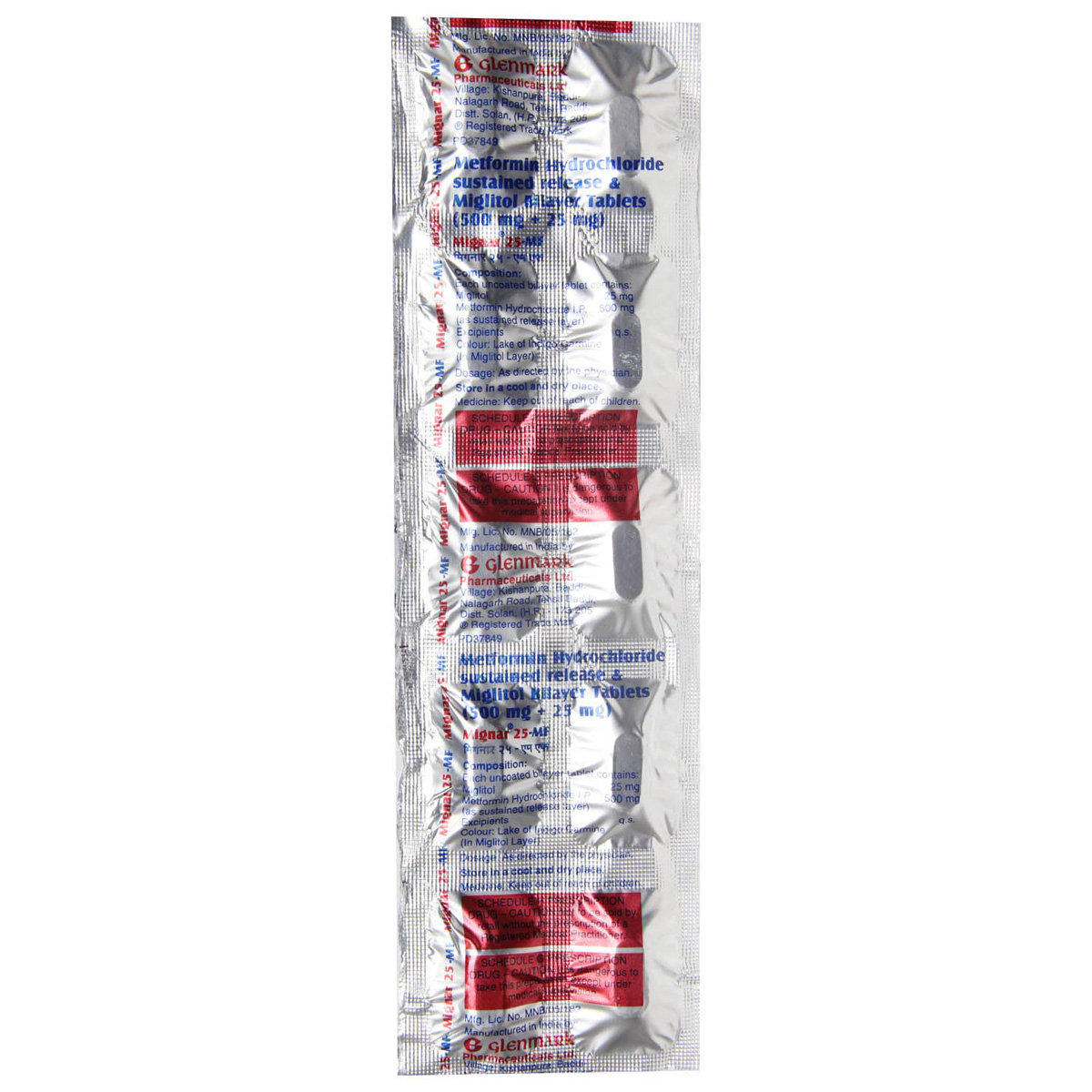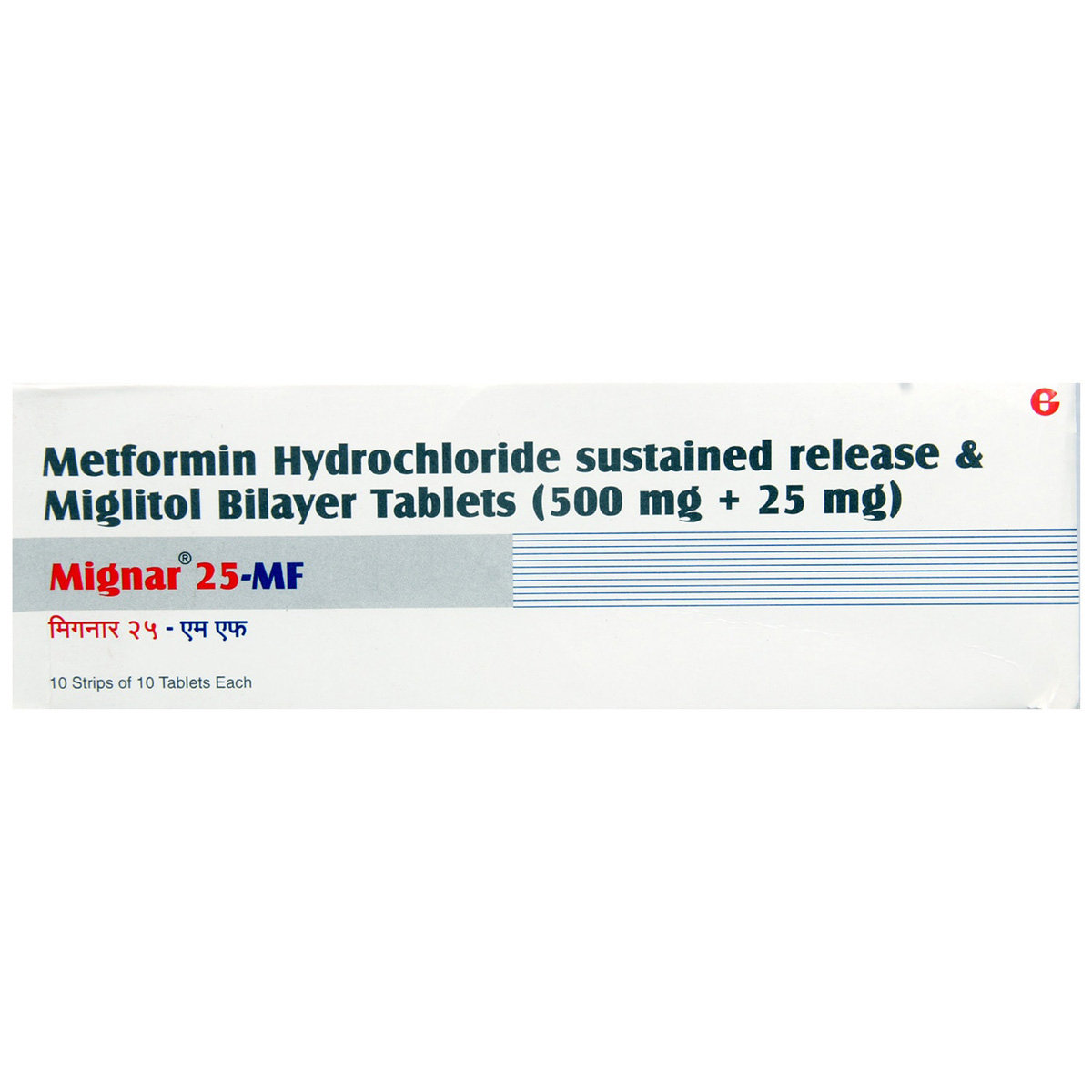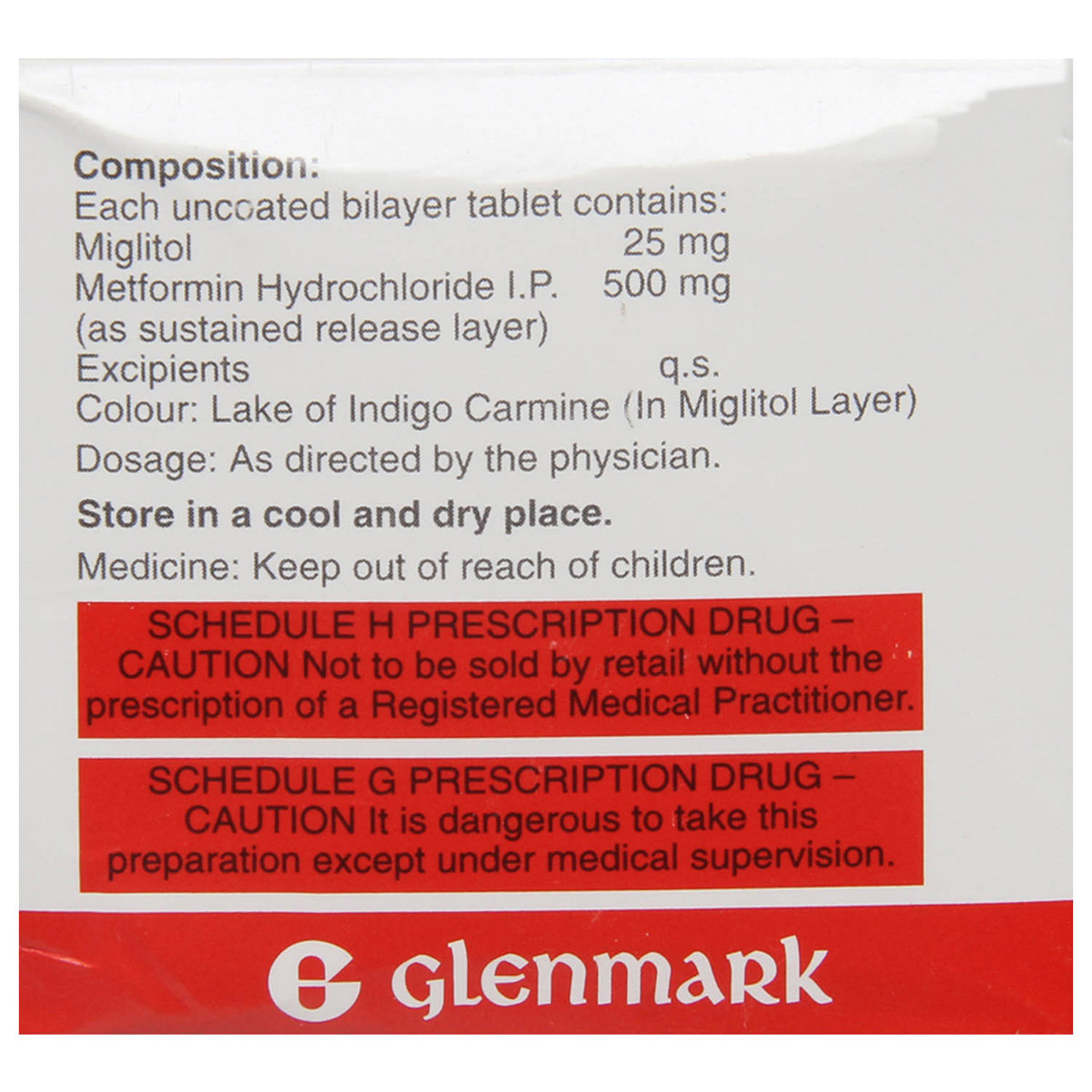Mignar 25-MF Tablet 10's
MRP ₹181
(Inclusive of all Taxes)
₹27.1 Cashback (15%)
Provide Delivery Location
Online payment accepted
 Prescription drug
Prescription drugWhats That
Composition :
Manufacturer/Marketer :
Consume Type :
Expires on or after :
Return Policy :
About Mignar 25-MF Tablet
Mignar 25-MF Tablet belongs to the class of medications called ‘antidiabetic drugs’ used to treat type 2 diabetes mellitus. Type 2 diabetes mellitus is a chronic or life-long condition in which blood sugar or glucose levels rise more than normal. It occurs when the body does not produce enough insulin (utilizes glucose to produce energy) or if produced, it cannot function properly in the body.
Mignar 25-MF Tablet contains Miglitol and Metformin. Metformin acts by decreasing liver glucose production and intestinal glucose uptake. Miglitol works by inhibiting intestinal enzymes that break complex sugars into simple sugars like glucose. Together, Mignar 25-MF Tablet can effectively prevent the rise in glucose levels in the body.
You should take this medicine exactly as prescribed by the doctor. The common side-effects of Mignar 25-MF Tablet are flatulence (gas), diarrhoea, abdominal pain, feeling sick (nausea), being sick (vomiting) and loss of appetite. These side effects can be reduced if this medicine is taken with food or after a meal. However, if any of these side effects persist or get worse, inform your doctor immediately.
It is not recommended to take Mignar 25-MF Tablet if you are allergic to any contents of it. Mignar 25-MF Tablet is not recommended if you are having any intestinal problems such as inflammation, ulcers, blockage, hernia, liver problems, severe kidney impairment, uncontrolled diabetes, severe dehydration, severe infections, and a recent history of heart attack or heart failure. Mignar 25-MF Tablet is not recommended for children and adolescents below 18 years, pregnant women, and breastfeeding mothers. It should be used with caution in elderly people as they may require dose adjustments. Mignar 25-MF Tablet may interact with alcohol and worsen the condition. Mignar 25-MF Tablet may cause hypoglycemia (low glucose levels), so avoid driving if you develop weakness, dizziness, fast heartbeat, or decrease in alertness.
Uses of Mignar 25-MF Tablet
Directions for Use
Key Benefits
Mignar 25-MF Tablet is a combination of two drugs: Miglitol and Metformin. This combination therapy is preferred in patients with poorly controlled diabetes. It reduces blood glucose levels, especially post-prandial glucose levels (glucose levels after meals) in type 2 diabetes mellitus patients. An increase in post-prandial glucose levels can be a risk factor for diabetes complications such as tissue and organ damage. So, a decrease in glucose levels helps control diabetes, reduce this risk and improve healthy life.
Storage
- Preventing Vomiting (Before it Happens)
- Take medication exactly as prescribed by your doctor. This can help minimize side effects, including vomiting.
- Having a small meal before taking your medication can help reduce nausea and vomiting.
- Talk to your doctor about taking anti-nausea medication along with your prescribed medication.
- Managing Vomiting (If it Happens)
- Try taking ginger in the form of tea, ale, or candy to help alleviate nausea and vomiting.
- What to Do if Vomiting Persists
- Consult your doctor if vomiting continues or worsens, consult the doctor for guidance on adjusting your medication or additional treatment.
- Inform your doctor about the nausea and discuss possible alternatives to the medication or adjustments to the dosage.
- Divide your daily food intake into smaller, more frequent meals to reduce nausea.
- Opt for bland, easily digestible foods like crackers, toast, plain rice, bananas, and applesauce.
- Avoid certain foods that can trigger nausea, such as fatty, greasy, spicy, and smelly foods.
- Drink plenty of fluids, such as water, clear broth, or electrolyte-rich beverages like coconut water or sports drinks.
- Use ginger (tea, ale, or candies) to help relieve nausea.
- Get adequate rest and also avoid strenuous activities that can worsen nausea.
- Talk to your doctor about taking anti-nausea medication if your nausea is severe.
- Record when your nausea occurs, what triggers it, and what provides relief to help you identify patterns and manage your symptoms more effectively.
- Tell your doctor about your GAS symptoms. They may change your medication regimen or prescribe additional drugs to help you manage them.
- To manage GAS symptoms, eat a balanced diet of fibre, vegetables, and fruits.
- Drink enough water throughout the day to avoid constipation and treat GAS symptoms.
- Regular exercise like yoga and walking may help stimulate digestion and alleviate GAS symptoms.
- Take probiotics only if your doctor advises, as they may help alleviate GAS symptoms by promoting gut health.
- Take medication for GAS symptoms only if your doctor advises, as certain medications can interact with your existing prescriptions or worsen symptoms.
- If symptoms persist, worsen, or are accompanied by severe abdominal pain, vomiting, or bleeding, seek immediate medical attention.
- Inform Your Doctor: Notify your doctor immediately about your diarrhoea symptoms. This allows them to adjust your medication or provide guidance on managing side effects.
- Stay Hydrated: Drink plenty of fluids to replace lost water and electrolytes. Choose water, clear broth, and electrolyte-rich drinks. Avoid carbonated or caffeinated beverages to effectively rehydrate your body.
- Follow a Bland Diet: Eat easy-to-digest foods to help firm up your stool and settle your stomach. Try incorporating bananas, rice, applesauce, toast, plain crackers, and boiled vegetables into your diet.
- Avoid Trigger Foods: Steer clear of foods that can worsen diarrhoea, such as spicy, fatty, or greasy foods, high-fibre foods, and dairy products (especially if you're lactose intolerant).
- Practice Good Hygiene: Maintain good hygiene to prevent the spread of infection. To stay healthy, wash your hands frequently, clean and disinfect surfaces regularly, and avoid exchanging personal belongings with others.
- Take Anti-Diarrheal Medications: If your doctor advises, anti-diarrheal medications such as loperamide might help manage diarrhoea symptoms. Always follow your doctor's directions.
- Keep track of your diarrhoea symptoms. If they don't get better or worse or are accompanied by severe stomach pain, blood, or dehydration signs (like extreme thirst or dark urine), seek medical help.
- If you experience low blood sugar levels, inform your doctor. They will assess the severity and make recommendations for the next actions.
- Your doctor will assess your symptoms, blood sugar levels, and overall health before recommending the best course of action, which may include treatment, lifestyle modifications, or prescription adjustments.
- Follow your doctor's instructions carefully to manage the episode and adjust your treatment plan.
- Make medication adjustments as recommended by your doctor to prevent future episodes.
- Implement diet and lifestyle modifications as your doctor advises to manage low blood sugar levels.
- Monitor your blood sugar levels closely for patterns and changes.
- Track your progress by recording your blood sugar levels, food intake, and physical activity.
- Seek further guidance from your doctor if symptoms persist or worsen so that your treatment plan can be revised.
- Consult your doctor if you experience nasal congestion, runny nose, or sinus pressure after taking medication.
- Your doctor may adjust your treatment plan by changing your medication, adding new medications, or providing guidance on managing your rhinitis symptoms.
- If advised by your doctor, use nasal decongestants or saline nasal sprays to help relieve nasal congestion.
- Practice good hygiene, including frequent handwashing, avoiding close contact with others, and avoiding sharing utensils or personal items.
- Stay hydrated by drinking plenty of water and other fluids to help thin out mucus and soothe your nasal passages.
- Hydrate your body: Drink enough water to prevent dehydration and headaches.
- Calm Your Mind: Deep breathing and meditation can help you relax and relieve stress.
- Rest and Recharge: Sleep for 7-8 hours to reduce headache triggers.
- Take rest: lie down in a quiet, dark environment.
- Cold or warm compresses can help reduce tension.
- Stay Upright: Maintain good posture to keep symptoms from getting worse.
- To treat headaches naturally, try acupuncture or massage therapy.
- Over-the-counter pain relievers include acetaminophen and ibuprofen.
- Prescription Assistance: Speak with your doctor about more substantial drug alternatives.
- Severe Headaches: Seek emergency medical assistance for sudden, severe headaches.
- Frequent Headaches: If you get reoccurring headaches, consult your doctor.
- Headaches with Symptoms: Seek medical attention if your headaches include fever, disorientation, or weakness.
Drug Warnings
Mignar 25-MF Tablet may cause a rare and serious side effect ‘lactic acidosis’ (buildup of lactic acid in the blood), characterized by abdominal pain, muscle cramps, vomiting, severe fatigue, and difficulty breathing. It is a life-threatening condition that requires immediate medical attention. Inform your doctor if you have any severe liver or kidney problems as their normal functioning is required to eliminate excess lactic acid from the body. Consumption of alcohol, prolonged fasting, dehydration, uncontrolled diabetes, serious infections, and liver problems increases the risk of lactic acidosis. If you have dehydration (severe loss of body fluids) due to severe vomiting, diarrhoea, exposure to heat, or fever, stop taking Mignar 25-MF Tablet and immediately seek medical attention. Mignar 25-MF Tablet may cause hypoglycemia (low blood sugar) and its symptoms include sweating, dizziness, palpitations (pounding heartbeat), and shivering, etc. Whenever you experience any of these symptoms, immediately consume candies or glucose biscuits rather than ordinary sugar. If your condition doesn’t improve, consult your doctor immediately.
Drug-Drug Interactions
Drug-Drug Interactions
Login/Sign Up
Co-administration of Mignar 25-MF Tablet and Iodamide can increase the risk of lactic acidosis (when the body produces too much lactic acid).
How to manage the interaction:
Taking Mignar 25-MF Tablet with Iodamide is generally avoided as it can result in an interaction, please consult your doctor before taking it.
Co-administration of Mignar 25-MF Tablet and Iobenzamic acid can increase the risk of lactic acidosis (when the body produces too much lactic acid).
How to manage the interaction:
Taking Mignar 25-MF Tablet with Iobenzamic acid is generally avoided as it can result in an interaction, please consult your doctor before taking it.
Co-administration of Mignar 25-MF Tablet with Metrizamide together can cause the risk of lactic acidosis (when the body produces too much lactic acid ).
How to manage the interaction:
Taking Mignar 25-MF Tablet with Metrizamide is generally avoided as it can possibly result in an interaction, it can be taken if a doctor has advised it. However, if you experience headaches, muscle cramps or pain, contact a doctor immediately. Do not discontinue any medications without consulting a doctor.
Co-administration of Iopydol with Mignar 25-MF Tablet can increase the risk of side effects.
How to manage the interaction:
Taking Mignar 25-MF Tablet with Iopydol is not recommended, please consult your doctor before taking it.
Co-administration of Mignar 25-MF Tablet and Iocarmic acid can increase the risk of lactic acidosis (when the body produces too much lactic acid).
How to manage the interaction:
Taking Mignar 25-MF Tablet with Iocarmic acid is generally avoided as it can result in an interaction. please consult your doctor before taking it.
Co-administration of Iodixanol with Mignar 25-MF Tablet can increase the risk of side effects.
How to manage the interaction:
Taking Mignar 25-MF Tablet with Iodixanol is not recommended, please consult a doctor before taking it. Do not discontinue the medications without consulting a doctor.
Co-administration of Mignar 25-MF Tablet and Iobitridol can increase the risk of lactic acidosis (when the body produces too much lactic acid).
How to manage the interaction:
Taking Mignar 25-MF Tablet with Iobitridol is generally avoided as it can result in an interaction. Please consult your doctor before taking it.
Co-administration of Ioversol with Mignar 25-MF Tablet can increase the risk of side effects.
How to manage the interaction:
Taking Mignar 25-MF Tablet with Ioversol is not recommended, please consult your doctor before taking it.
Co-administration of Iopamidol with Mignar 25-MF Tablet can increase the risk of side effects.
How to manage the interaction:
Taking Mignar 25-MF Tablet with Iopamidol is not recommended, please consult a doctor before taking it. Do not discontinue the medications without consulting a doctor.
Co-administration of Iotroxic acid with Mignar 25-MF Tablet can increase the risk of side effects.
How to manage the interaction:
Taking Mignar 25-MF Tablet with Iotroxic acid is not recommended, please consult your doctor before taking it.
Drug-Food Interactions
Drug-Food Interactions
Login/Sign Up
Diet & Lifestyle Advise
- Fill your half plate with starchy veggies, a quarter with proteins, and a quarter with whole grains.
- Eat at regular intervals. Do not take the long gap between a meal or snack.
- Monitor your blood sugar level regularly, especially when there are a lot of fluctuations.
- Invest in at least 150 min of moderate-intensity physical activity and 15 minutes of high-intensity exercise every week.
- Lose weight gradually to achieve a healthy body mass index (18.5 to 24.9).
- Replace refined carbohydrates containing whole-grain foods and increase intake of fruits and veggies and other fiber-enriched foods.
- Reduce intake of saturated fat (or hidden fats) in food like chips, crisps, pastries, biscuits, and samosas. Choose omega-3 fatty acid-containing oils for daily cooking. You may use palm oil, mustard oil, groundnut oil, rice bran oil, and safflower oil for frying.
- Do not take stress as it may elevate your blood sugar level. You may adopt stress management techniques like mindfulness, yoga, or meditation to control stress-related blood sugar changes.
- Opt for low-fat dairy products (low-fat yogurt, fat-free milk, cheese, etc.).
- Keep your blood pressure as normal (120/80) as possible as it reduces the risk of cardiovascular diseases in diabetes patients.
Side Effects of Mignar 25-MF Tablet
- Flatulence (gas)
- Diarrhoea
- Abdominal pain
- Feeling sick (nausea)
- Being sick (vomiting)
- Loss of appetite
Habit Forming
Therapeutic Class
All Substitutes & Brand Comparisons
RX
Out of StockMignar25-MF Tablet SR
Glenmark Pharmaceuticals Ltd
₹181
(₹16.29 per unit)
Drug-Diseases Interactions
Drug-Diseases Interactions
Login/Sign Up
FAQs
Drug-Drug Interactions Checker List
- IBUPROFEN
- CELECOXIB
- CIMETIDINE
- OMEPRAZOLE
- SALBUTAMOL
- TERBUTALINE
- DOLUTEGRAVIR
- VERAPAMIL
- RAMIPRIL
- LOSARTAN
- TELMISARTAN
- RIFAMPICIN
- TRIMETHOPRIM
- RANOLAZINE
- VANDETANIB
- OLAPARIB
- ISAVUCONAZOLE
- PANCREATIN
- AMYLASE
- BISACODYL
- SENNA GLYCOSIDES
- SODIUM PICOSULFATE
Special Advise
- Beware of hypoglycemia (low blood sugar level) symptoms include sweating, dizziness, palpitations, shivering, confusion, irritability, etc. Whenever you experience these symptoms, try to eat candies or glucose biscuits and get in touch with your doctor. Make sure you carry these with you at all times, especially for long travels.
- Before undergoing examinations such as an X-ray or CT scan or undergoing surgery, inform your doctor that you are taking Mignar 25-MF Tablet . This medicine needs to be stopped before undergoing surgery or examination.
Disease/Condition Glossary
Type 2 Diabetes Mellitus: It is a chronic or lifelong disease that keeps the body away from properly utilizing insulin. Hence, people affected with type 2 diabetes either do not produce enough insulin or are resistant to insulin. Middle-aged or older are most likely to suffer from type 2 diabetes, which is also known as adult-onset diabetes. Type 2 diabetes symptoms include increased thirst, frequent urination at night, slow wound healing, increased hunger, fatigue and blurred vision. In some cases, there may be weight gain while in rare cases weight loss may be observed. The complication of type 2 diabetes also include neuropathy (nerve problems), nephropathy (kidney problems) and retinopathy (damaged retina of eyes or blindness), loss of limbs, sexual dysfunction and increase chance of heart attack or stroke.

Have a query?
Alcohol
Safe if prescribed
Consumption of alcohol may increase the risk of side effects and worsen the condition.
Pregnancy
Consult your doctor
Mignar 25-MF Tablet is a category B medicine and may not cause harmful effects to the unborn baby. However, it should be used in pregnant women only if clinically needed.
Breast Feeding
Consult your doctor
Mignar 25-MF Tablet should not be given to breastfeeding mothers as it may pass in breast milk and cause adverse effects in the nursing baby.
Driving
Safe if prescribed
Mignar 25-MF Tablet may impair alertness or decrease concentration, so avoid driving or operating heavy machinery in such cases.
Liver
Consult your doctor
Mignar 25-MF Tablet should be used with caution in patients with liver diseases. The dose may have to be adjusted by your doctor.
Kidney
Consult your doctor
Mignar 25-MF Tablet is not recommended for use in patients with severe kidney impairment. In patients with mild to moderate kidney diseases, your doctor may have to adjust the dose.
Children
Safe if prescribed
Mignar 25-MF Tablet is not recommended for children and adolescents below 18 years of age.



